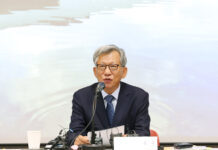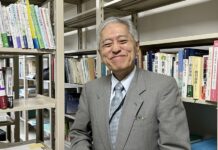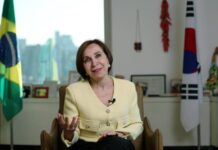The intense global fervor for Hallyu (Korean Wave) has shone the spotlight on Korea not just for K-pop but other sectors such as food, fashion and business. Major contributors to this phenomenon are ethnic Koreans worldwide, who despite being born and raised outside of Korea, energetically promote their motherland thanks to their Korean DNA. This series of interviews conducted by Korea.net, an affiliate of the Korean Cultural and Information Service, and Yonhap News features such figures who use their activities in the mainstream of their respective countries to elevate the status of Koreans and bridge the Land of the Morning Calm with their host nations.
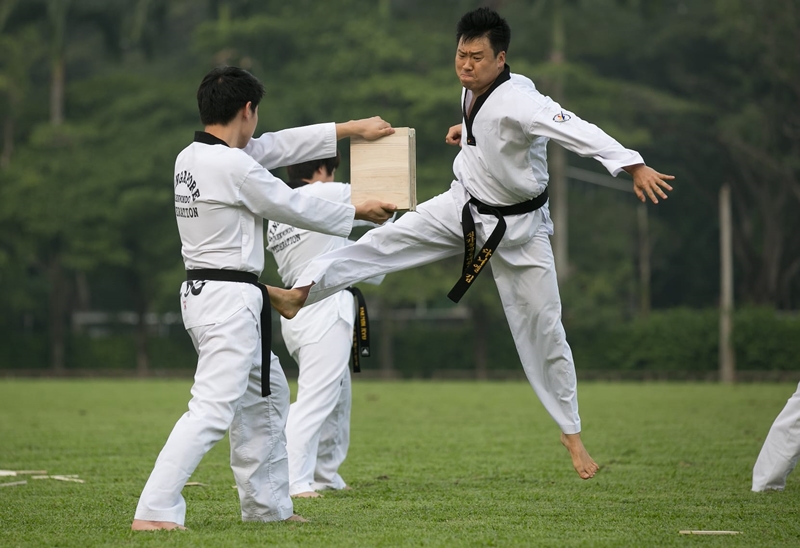
Ildo Taekwondo founder and CEO Kim Jong Yoon in October 2015 in Singapore performs breaking at the 2015 Korea Cup hosted by Singapore Polo Club.
By Cao Thi Ha of Korea.net and Kang Sung-chul of Yonhap News
Photos = Kim Jong Yoon
“Rather than fostering athletes who gain fighting skills or earn Olympic medals, I emphasize while teaching taekwondo raising the number of students who improve their physical and mental health through character development.”
Taekwondo master and entrepreneur Kim Jong Yoon said this in a joint written interview on Nov. 29 with Korea.net and Yonhap News. His Ildo Taekwondo Academy in Singapore has about 1,000 students across three studios.
“Taekwondo spread K-Culture to the world before K-pop, K-dramas and K-food,” he added. “I first convey the spirit of manners, patience and self-mastery before teaching poomsae (forms).”
Aiming to open 100 studios in Singapore and Vietnam, Kim earned a master’s in business administration from Sungkyunkwan University in Seoul after studying in Japan. He moved to Singapore in 2004 to propagate taekwondo.
He is also the coach of the Singaporean national demonstration team for taekwondo and runs studios in Bukit Timah, West Coast and Bedok.
One of his students, Lynn Soh, 79, was unable to walk due to physical discomfort but now can thanks to taekwondo. Her battle to walk again and regain her health to the extent of doing poomsae with precision made her a sensation in her country.
In the interview, Kim discussed his priority on propagating taekwondo’s culture and spirit rather than techniques.
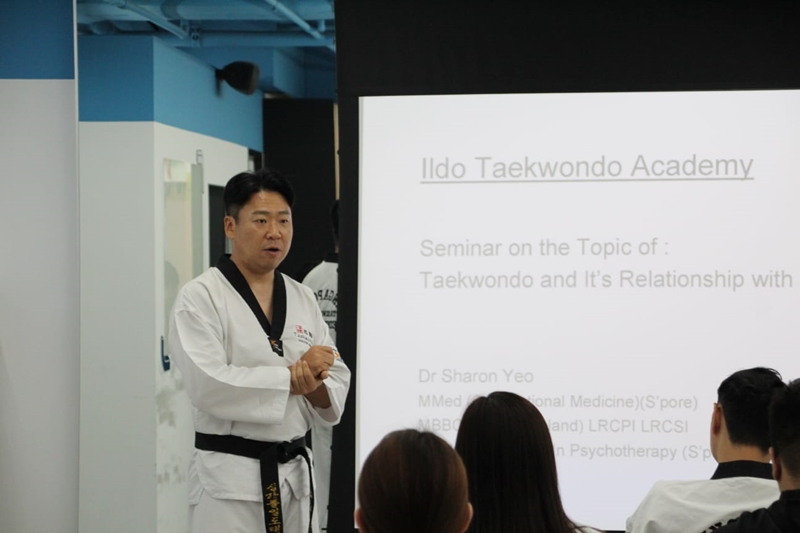
Ildo Taekwondo founder and CEO Kim Jong Yoon in August announces the direction and goals of this year’s taekwondo curriculum for senior citizens at his studio in Bukit Timah, Singapore.
Why did you choose taekwondo as a career?
I began learning taekwondo at age 5. The studio I attended at the time was Ildo Taekwondo, so I run a branch in Singapore under the same name. While studying in Japan, I taught taekwondo to children and I learned the value and joy of education while teaching Sunday school at a church, so I chose the path of an educator.
Why do you promote taekwondo in Singapore and how popular is it there?
As a fifth-degree blackbelt, I opened a academy there because I wanted to properly teach the values of our national sport, taekwondo. I pondered how to disseminate taekwondo, Korea’s gift to the world, in Singapore and wanted to make a difference in children’s lives by focusing on character education, which isn’t taught in schools.
Singapore is a country of international trade, finance and logistics and home to a diversity of people from around the world. Fundamentally, residents care a lot about their children’s education.
The educational level is high here but there is a lack of education on filial piety, character and self-esteem, and I concluded that taekwondo could fill this gap. An estimated 30,000 people in Singapore learn taekwondo, which indicates high popularity considering that the ethnic Korean population here is about 30,000. The country has many taekwondo studios but local governments such as district and neighborhood offices also offer classes.
What aspects do you focus on when teaching?
Many youths learn taekwondo to boost their physical strength, learn self-defense or compete in international competitions to win medals for poomsae. Ildo Taekwondo Academy, however, doesn’t focus its curriculum on winning medals.
To provide a well-rounded education that changes student attitudes toward life, we offer customized instruction by age and gender.
We start with changing the misconceptions of taekwondo as merely a martial art for training in kicking and punching. Luckily, over 90% of our students agree with our teaching methods and follow them well.
We first teach them about taekwondo’s physical movements and the positive effects they have on the body. Our priority is to stress how such movements help self-training.
As a result, many students at Ildo Taekwondo are in their 60s and 70s. More than 70% of Chinese Singaporeans who enjoy tai chi or wushu (kungfu) can sufficiently relate to taekwondo, so I’m certain of its high potential as a silver (geriatric) sport.
Who is your most memorable student?
I remember teaching Master Kim Dae-won the most. He didn’t major in taekwondo in college but learned it and now teaches it at an alternative school for intellectually disabled students at Hosanna College (in Gapyeong-gun County, Gyeonggi-do Province).
Few know this but he works at an invisible place to educate the underprivileged, so I applaud him with my respect and gratitude for going beyond rewards. Kim has dedicated himself to help intellectually disabled students communicate with the world and grow healthier through taekwondo. I also believe this is what Ildo Taekwondo should strive for.
Explain the spirit of taekwondo.
In other words, the taekwondo spirit of “cultivating a healthy body and mind through training the mind and body” means to lead to foster people who help not just their own families but also their society and nation.
Ildo Taekwondo’s educational goal is to build a successful society by bringing together healthy people. Singapore has many one-child families so we try to clearly distinguish the roles of parents and children and teach five values: manners, patience, confidence, harmony, and sharing and volunteerism.
We strive not only to simply teach a martial art but also to emphasize the importance of family and sense of belonging to the society they belong to through small actions.
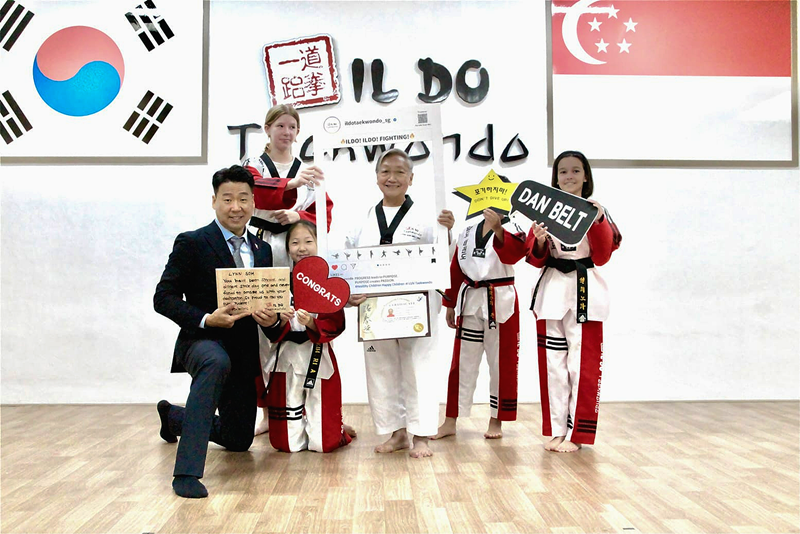
Ildo Taekwondo Academy founder and CEO Kim Jong Yoon (left) in February takes a photo with Lynn Soh (fourth from left) and other students at the academy’s headquarters in Bukit Timah, Singapore, at an event marking Soh’s promotion to second-degree blackbelt.
You are opening an academy in Ho Chi Minh City, Vietnam.
I consider this a good opportunity as Vietnam is a country in Southeast Asia with incredibly high potential for growth, with many colleges there having with Korean-language departments or offering related courses.
Members of the Vietnamese national taekwondo sparring team are outstanding in that they’ve earned awards at global championships. Yet the dissemination of basic knowledge like the taekwondo spirit is low. I want to lay the foundation so that colleges there open taekwondo departments.
Is it hard to teach taekwondo to foreign nationals?
It wasn’t easy conveying the perseverance and values of taekwondo to students and parents since their culture is different from Korea’s, which focuses on grades. So student mindsets differ when it comes to belt tests and sparring competitions.
When I give the command “One, two, three” in Korean, the students can imitate my pronunciation but I sense a different mental attitude following the shout.
This is a cultural difference that I must acknowledge and teach. I cannot expect a positive response if I unconditionally instill a Korean way of thinking.
But students 100% trust and follow the leadership of taekwondo masters and instructors who come from Korea, so I find it highly rewarding to teach them.
What is your ultimate goal?
Ildo Taekwondo Academy strives to communicate with people worldwide through the language of taekwondo. Above all, I want to help students appreciate love from their parents, feel the importance of family, enhance their self-esteem through a healthy body and develop into talented people who contribute to Singapore. Based on this, I want to create a sports education system that contributes to the globalization of taekwondo.
shinn11@korea.kr


